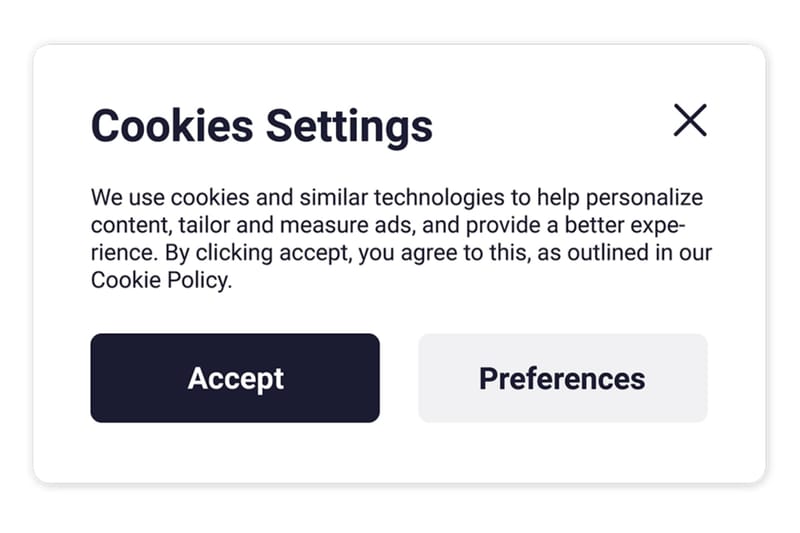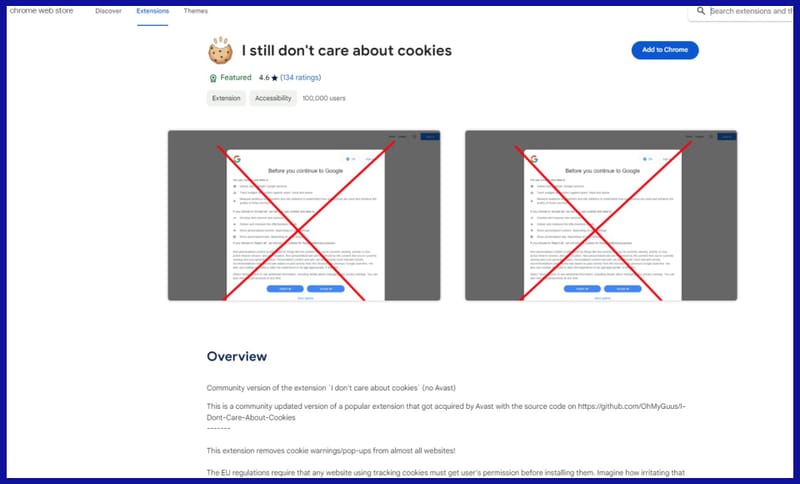I Still Don't Care About Cookies: The Extension

In recent years, internet users have become all too familiar with the intrusive presence of cookie boxes that greet them upon visiting almost any website. These are often adorned with phrases like "We use cookies to improve your experience," which have become a staple of online browsing. But what exactly are these, and why do websites feel the need to remind us of their existence constantly?
Cookies are small text files that websites place on users' devices to track their activities and preferences. They serve various purposes, such as remembering login credentials, analyzing website traffic, and delivering personalized content; however, due to privacy concerns and regulations like the General Data Protection Regulation (GDPR) under EU regulations.
This requirement has led to the proliferation of cookie warnings, which now inundate users' screens every time they visit a new website. While the intention behind these boxes is to inform users, they have become a source of annoyance and frustration for many internet users.
The constant barrage has led to a phenomenon known as "cookie fatigue." Users are bombarded with these notifications to the point where they ignore them without reading the content. Some users go to the settings and remove or delete cookies themselves. This fatigue stems from several factors:
Overwhelming frequency: Users encounter cookies on every website they visit, leading to a sense of overload and annoyance.
Repetitive language: The language is generic and repetitive, making users feel like they're being subjected to the same message over and over.
Lack of meaningful choice: Despite being asked, users often feel like they have little to no control over the data being collected or how it's used, leading to a sense of resignation and apathy.
As a result, many users have expressed frustration with the current state of notifications. They are seeking solutions to alleviate the burden of constant interruptions during their browsing sessions.
Recognizing the need for a more user-friendly approach to managing cookies, developers have begun creating browser extensions specifically designed to tackle this issue for Chrome and Firefox. These offer users greater control over their preferences and can help streamline the browsing experience by automatically handling requests.
By installing, users can avoid the hassle of dealing with repetitive dialogue boxes and instead enjoy a smoother, more seamless browsing experience. These typically offer features such as customizable settings, automatic management, and the ability to block or allow cookies on a per-site basis.
Understanding Cookie Fatigue

Cookies are small text files that websites store on users' devices to track their activities and preferences. They serve various purposes, such as remembering login credentials and personalizing content.
Regulations like GDPR require websites to obtain user consent before deploying them, which has led to the widespread implementation of notifications as a means of compliance. Navigating these requirements can be complex, but a GDPR compliance roadmap can provide a step-by-step guide, helping businesses ensure they meet all necessary regulations—from obtaining consent for cookies to handling other critical compliance measures.
Users frequently ignore or dismiss such notifications due to their overwhelming frequency, repetitive language, and perceived lack of control over data collection practices.
Repeated cookie requests contribute to user frustration and disrupt the browsing experience. Users may feel inundated with notifications, leading to decreased engagement with websites and a negative perception of their user experience.
The Extension

"I Still Don't Care About Cookies" is a browser extension designed to address the persistent issue of consent fatigue experienced by internet users. This aims to streamline the browsing experience by providing users with greater control over their cookie preferences and reducing the frequency of intrusive pop-ups.
Features:
Automatic cookie management: It automatically handles requests, sparing users from the hassle of constantly dismissing them.
Customizable settings: Users can customize their consent preferences, choosing to accept or reject cookies based on their preferences automatically.
Granular control: It allows users to manage cookies on a per-site basis, giving them greater control over their online privacy.
Minimalist design: It features a minimalist design that seamlessly integrates into the browsing experience without causing distractions.
Compared to existing cookie browser extensions, it offers a more user-friendly and customizable solution to cookie fatigue. While others may offer similar features, such as automatic management, few provide the level of customization and granular control.
Automating the management of cookie requests and providing users with customizable consent settings aims to alleviate the burden of constant interruptions during browsing sessions.
The extension seeks to enhance the overall browsing experience and mitigate cookie fatigue by reducing the frequency of cookie dialogues and giving users greater control over their online privacy.

Sathish S
I was the Weasley twins from Harry Potter at my school. Becoming an entrepreneur was something I knew I wanted to become right when I was a little kid selling the latest pokemon cards and candies to my classmates.
